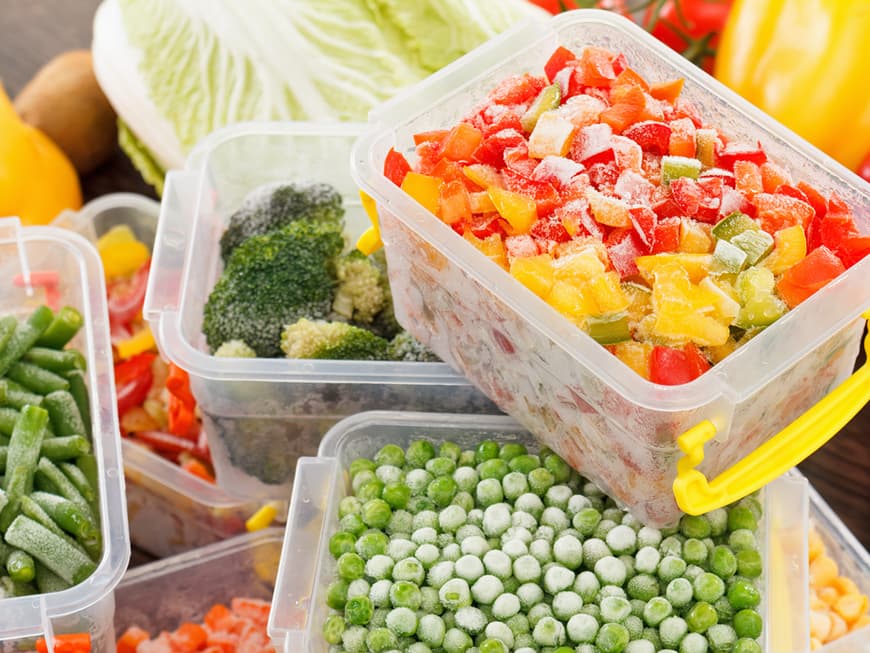
In addition to meat, fish, cakes and cooked dishes, egg whites or wine (as ice cubes) can also be frozen. However, the cell structures of berries or tropical fruits are destroyed by freezing, they become mushy and lose their taste. See our overview for more tips.
Can I freeze these foods? Yes
Vegetables
There are a few exceptions, otherwise vegetables generally freeze well. Blanch firm varieties such as carrots, broccoli and cauliflower briefly in boiling water and then rinse in ice water. This preserves the vitamins. Before you put them in the freezer, pat them dry, bag them and seal them airtight.
Herbs
Either pack them in a freezer bag or freeze them as ice cubes. Keeps for approx. 10 months.
Fruit
Berries can be frozen well, apples and pears are also suitable, but should be cut into small pieces or made into compote. This also preserves the flavor. With stone fruit such as peaches, remove the stone. Cut bananas into pieces, pre-freeze on a tray, then freeze in bags. Make ice cream or smoothies from them as desired.
Baked goods
Ready-baked bread, yeast, cheese and sponge cakes, as well as raw dough, do not lose any of their quality when frozen. On the contrary: if the rolls and bread are then briefly baked in a hot oven, they are fresh and crispy.
Cheese
The higher the fat content, the better the cheese will withstand freezing. Hard or semi-hard cheeses are best. Raw and soft cheeses, on the other hand, are unsuitable: The cold temperatures completely destroy the structure of these types.
Sausage
Freeze meat and sausage in small portions. Use bags that you can seal airtight - this prevents freezer burn caused by the cold. Tip: The current date on the bag provides an overview in the freezer compartment.
Can I freeze these foods? No
Cucumbers & tomatoes
Tomatoes, onions and cucumbers contain a lot of water. They are unsuitable for freezing: After defrosting, they are mushy, shapeless and tasteless. Better to cook them into purees and sauces, then put them in the freezer.
Milk & eggs
Fresh milk, cream, yogurt or raw eggs cannot be frozen. The cold temperatures destroy the milk proteins and cream and yoghurt flake or become gritty, just like cream cheese. With eggs, the cold causes the shell to crack. Better: buy UHT milk, keep fresh milk in the fridge, store eggs in a dry place.
Raw potatoes
Freezing gives them a sweet taste and makes them soft. They freeze better when made into chips or croquettes. Ideal: Store raw potatoes in a cool place in dark cloth bags.
Tomatoes & radishes
They lose their flavor when frozen and quickly become mushy after defrosting.
Grapes
Grapes and watermelons are not suitable for freezing. The fruit loses its flavor and structure. It is better to store the fruit in the fridge and eat it as soon as possible.
Leaf lettuce
Lettuce, oak leaf or iceberg lettuce have a lot of water in their cells, which is why they are mushy, soft and inedible after defrosting. Better: buy only when needed, store in the vegetable compartment of the fridge and eat soon.
You might also be interested in this:
